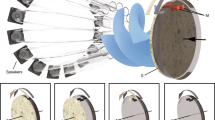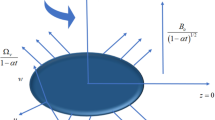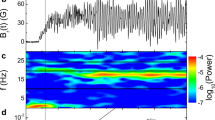Abstract
THE stresses set up in a rotating disk appear first to have been considered by Maxwell1, and the solution adopted by many engineering text-books2 shows that an axial hole, however small, halves the strength of the disk. This result, which is repugnant to physical intuition, does not appear to have been tested experimentally. During the design of an ultra-centrifuge3 to be used for separating isotopes, we had to investigate the effect of a small axial hole on the bursting speed of the rotor, and it is interesting to compare our results with the above theory.
This is a preview of subscription content, access via your institution
Access options
Subscribe to this journal
Receive 51 print issues and online access
$199.00 per year
only $3.90 per issue
Buy this article
- Purchase on Springer Link
- Instant access to full article PDF
Prices may be subject to local taxes which are calculated during checkout
Similar content being viewed by others
References
J. C. Maxwell, ” Collected Papers”.
A. Stodola, ” Dampf und Gasturbinen”, Sixth Edit. Timoshenko and Lessels, ” Applied Elasticity”. J. Prescott, ” Applied Elasticity”.
J. W. Beams and E. G. Pickels, Rev. of Sci. Inst. (U.S.A.), Oct. 1935.
Author information
Authors and Affiliations
Rights and permissions
About this article
Cite this article
POLLOCK, H., COLLIE, C. Stresses in a Rotating Disk. Nature 137, 950–951 (1936). https://doi.org/10.1038/137950c0
Published:
Issue Date:
DOI: https://doi.org/10.1038/137950c0
Comments
By submitting a comment you agree to abide by our Terms and Community Guidelines. If you find something abusive or that does not comply with our terms or guidelines please flag it as inappropriate.



